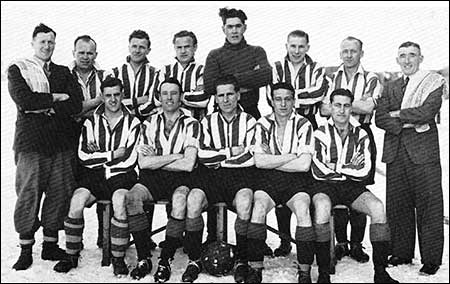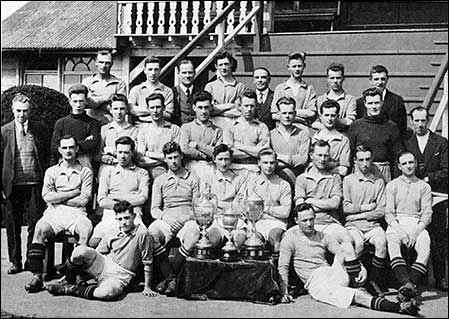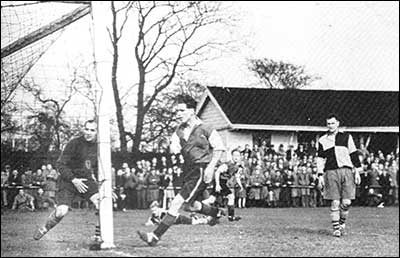NOBODY seems able to put their finger on exactly when Rushden Town came into being. But everyone is agreed on what constitutes the outstanding team in their long history.
 |
|
Carrying on where they left off — the Russians lifted the UCL knock-out cup in 1947 with a crowd of 1,816 seeing the 4-1 final win over Wisbech.
Back row (l-r): Bert Inwood (trainer), Reggie Bland, Doug Mantle, Bob Clarke, Geoff Andrews, Stan Toms, Ron Peacock, Tommy Robson (assistant-trainer). Front: Hoddy Childs, George Thorrington, Len Pipes, Tommy Thompson, Dennis Maddams.
|
In 1934 the Northamptonshire League changed its name to the United Counties League. And to mark the switch Rushden embarked on a run of four successive championship triumphs — a record which has never been equalled to this day.
As they finished runners-up both the season before and the season after their 'quadruple' title sweep, reached six successive NFA Senior Cup finals over the same period and collected the UCL knock-out Cup four times in five years the thirties can safely be called the golden age of Rushden Town!
No wonder Reggie Bland, right-half throughout the glory years as well as a later skipper and manager should recently declare: "Who knows what we might have achieved if Hitler hadn't marched into Poland in 1939."
Certainly Rushden couldn't rediscover the magic formula when hostilities ceased. They didn't win another UCL crown until 1963 and celebrated just one more, ten years later, before their step into the Southern League in 1984.
But the end to the flow of honours which poured into Hayden Road along with the bumper crowds cannot be totally put down to the war. For it is surely not insignificant that the club lost, in 1949, the man who had made the glory years happen — Cyril Freeman.
A player with Rushden Fossee before the First World War, Freeman became secretary in 1919 and for the next three decades ran the day to day affairs of the club while building a succession of outstanding teams.
Rushden had been Senior Cup winners five times in eleven finals before the turn of the century so lacked nothing in terms of tradition or local status.
But by the time Freeman was recruited the club was well overdue for something to cheer, their last tangible triumph having been their one and only Northants League title in 1903.
 |
|
A taste of things to come —the Rushden Town squad which won the first and second divisions of the Northants League, the Northants Senior Cup and the Rushden Charity Cup in 1926/27. Pictured in front of the cricket pavilion, they line-up, back row, from the left: J Emery, W Wright, J Lilley (team manager), C Richardson, E Bates (trainer), W Jolley, J Rodden, C Freeman (secretary). Middle row: W Hancock (trainer), H Groome, R Notton, H Leach, G Smith, S Bedford, W Dickens, H Whittington, H Walker, R Smith (linesman). Seated: A Cox, S Westley, M Boyd, S Seddon (captain), S George, A Russell, A Langham, F W Cook. Front: W Hemmington, W Burnand.
|
Among his first tasks was setting up a seperate ground from the cricket club, who the Russians had previously shared with. Then, in 1922, the present grandstand and enclosure was opened.
And when the hard work off the field led to Rushden turning the corner on it what followed was well worth the wait.
Rushden marked their ressurrection with a hat-trick of outright Senior Cup wins between 1926 and 1928 — a feat which was not matched until Kettering Town completed their hat-trick in 1986.
 |
|
Len Pipes scores Rushden Town's goal in their 1948 Senior Cup
final defeat at Wellingborough Town.
|
They were the years of the great depression, but not at Hayden Road (or Newton Road as it was sometimes known as then) where Freeman expertly turned the national crisis to the advantage of his own club, who also won the Northants League in 1927.
Once a year he would take a holiday in the north-east, where unemployment was at its worst, specifically to find talented players who might jump at the chance of supplementing a ten shillings football wage with a guaranteed full time job with friendly local firms such as John Whites or Robert Marriott.
Among the Geordies lured south in this way was Johnny Hindmarsh, an outstanding inside-forward in the team which repeated the Northants League/Senior Cup double in 1930.
Hindmarsh cracked 34 goals that season and was still only the clubs third highest scorer behind Shipley(46) and 'the craftiest player in the Northants League', skipper Steve Seddon (351.
Seddon, according to the Sports Telegraph's 'Wandering Russian' at the time capable of inspiring his colleagues by "doing great things at critical moments", set a career scoring record of 126 goals — but it didn't last for long as Freeman continued to improve the side, culminating in that staggering thirties run.
Hindmarsh himself had topped a century and a half long before the end of the 1934 35 season, when Rushden collected a treble of UCL title, UCL Cup and Senior Cup.
And by then he had been overhauled by Mick Eyre, who scored over sixty in that campaign to complete a double ton having netted 48, 56 and 44 in his first three seasons after signing from Northampton Town.
Despite amassing 250 league and cup goals in 1935/36 Rushden had to settle for 'just' another UCL title. But they did the treble again in 1937 and were close to repeating it the following year. S and L dashing their hopes in the Senior Cup final.
At the end of those four all-conquering seasons Rushden still had five regulars who had been fixtures at the start. Little Reggie Bland, who once had a wing-half partnership with elder brother George spanning 250 consecutive games, was one of them and three of the others were in defence — keeper Albert Wallington and full-backs Patenall and Bert Inwood.
The fifth member of the exclusive club was one of Freeman's most inspired signings. captain and inside-left George Hillyard, who surprisingly departed from his native Wellingborough to brilliantly prompt a high-scoring forward line (all of whom, incidentally, got on the scoresheet when Rushden beat Peterborough Westwood 14-0 in March 1937).
Freeman's only cause for regret was that he could never get his hands on the Maunsell Cup, Northampton Town pipping his Russians in the final in 1933, 1935 and 1936.
A teetotaller known for his bowler hat, Freeman was still actively pursuing the club's interests until his death from a heart-attack, one of his last achievements being the concreting of the remaining three sides of the ground with money recieved from West Bromwich Albion for Gordon Inwood.
His influence was such that picking up the reins was an almost impossible job for those who followed. But the club were fortunate to have a worthy successor in Ken Ambridge, who sold chocolates from a tray as a boy in the thirties and gave the club more substantial service in 26 years as secretary from 1952 to 1978.